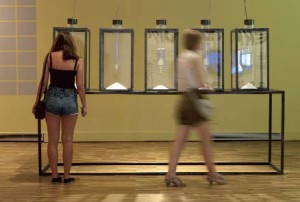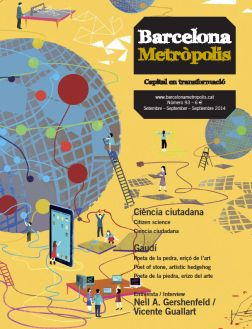Citizen science may offer a more democratic and more transparent way of doing things, clearly aligned with the vision some people have of social innovation under the name of citizen lab.
“By operating without a leader, the scout bees of a swarm of neatly avoid one of the greatest threats to good decision making by groups: a domineering leader. Such an individual reduces the group’s collective power to uncover a diverse set of possible solutions to a problem, to critically appraise these possibilities, and to winnow out all but the best one.” Thomas D. Seeley, Honeybee Democracy (2010)
Bees have developed a collective sense that might not be directly transposable to human behaviour. Many experts have debated this topic. However, it is indisputable that we can learn a lot from the behaviour of a colony when reflecting on the future of cities, on decision-making in these cities, and finally about what living in a city like Barcelona could mean.
The story I would like to tell starts around the beginning of 2012. It took place in our city. It is packed with details and facts, but its underlying ambition is redolent of a democracy typical of honey bees. Encouraged by the Department of Creativity and Innovation of the Barcelona City Council and countless brainstorming sessions, we decided to explore and implement citizen science practices. At that time, precious few people knew what this pair of words, so surprisingly unrelated, meant: citizen and science.
Internationally, the concept of “citizen science” was just taking root thanks to echo of the success of research projects in astronomy and molecular biology that were introducing citizens’ participation practices, the results of which were published in the most prestigious scientific journals, Nature and Science. One article that reviewed the phenomenon of citizen science defined it, clearly and forcefully, as: “People power”. Citizen science places citizens themselves within the research process, empowering them to participate to varying extents, and, in more extreme cases, giving them the reins of the research.
This approach transforms the concept of research in universities and research centres. It taps into social innovation, makers, hackers and other non-regulated technological communities that share an affinity with similar open worlds and the Creative Commons. But citizen science also distorts the do-it-yourself aspect of technology and promotes a “do-it-together” ethos when generating knowledge for everyone and with anyone. It breaks down the false boundary between basic science and applied science by empowering curious citizens to obtain knowledge that can be used immediately. It destroys the assembly line of scientific production in which citizens and society are the mere recipients of knowledge and technology. The change relocates individuals and their immanent amateurism in the engine room of science.
Thanks to the Barcelona The Lab event in November 2012, organized by the Department of Creativity and Innovation, the foundations of the first community of scientists interested in pushing citizen science projects forward were laid. As of January 2013, seven research groups from five different institutions1 started to work together, uniting a total of 23 researchers from different fields of knowledge, and promoting a total of nine projects. In 2013, a common protocol was produced through a decalogue of best practices. The initial group recently received a grant from the prestigious RecerCaixa programme that will enable it to work until 2016 on a common infrastructure and on the potential of citizen science with a view to renewing education in science and technology in informal settings.

© Albert Armengol
Aspect of the artistic and technological project Big Bang Data, exhibiting at the CCCB until late November 2014, and exploring the phenomenon of the explosion of data as the context for cultural and political thought in the modern world. The image shows artistic installations which use sensors to interact with visitors.
In perspective, it is pleasing to see how the abstract idea of a few scientists can capture the interest of many more. On 11 June 2014, within the programme for the Festival of Science, Technology and Innovation, the first Barcelona Citizen Science Day was held, bringing together over 90 participants and 28 speakers, and at which 22 projects were presented. In the course of the festival, six experiments with a remarkable solidity were proposed: MARduino; Urban Bees; Sea Watchers; AtrapaelTigre.com; Bee-Path: Experiments on Human Mobility; and Mr. Banks.
City government and management should play a crucial role in citizen science practices. This interest should also be reciprocal. Local authorities can facilitate and promote intermediation with citizens better than anyone else, although paradoxically no city in the world has made an explicit commitment to the practice of citizen science. There are some incomplete cases, such as New York,2 but there is no structure capable of reworking the concept of smart city from a city council through citizen science practices. Citizen science can bring citizens into social or social and environmental joint responsibility projects, and do so with a transformative capacity that only knowledge, and not unprocessed raw data, can deliver. Going back to the reference to the curious democracy of bees, citizen science can be a more democratic and more transparent way of doing things, clearly aligned with the vision that some people have of social innovation under the name of citizen lab.3
Barcelona City Council, through the Department of Creativity and Innovation, is building the BarcelonaLab platform. BarcelonaLab helps to increase the visibility of projects and has provided showcases for citizen science projects within the cultural infrastructure, such as the Library Network, the DAU Barcelona Festival, the Festival of Science, Technology and Innovation, the Centre of Contemporary Culture of Barcelona (CCCB), the Natural Science Museum and, more recently and albeit timidly, the Grec performing arts festival. BarcelonaLab is already thinking up a Citizen Science Office to articulate the relationship with citizens and researchers. This office, which would be the country’s first since the creation of the Spanish Foundation for Science and Technology (FECYT), should be capable of leveraging the results obtained to promote a better city design and to create new citizens’ policies.
In the meantime, we have tried out different scenarios regarding the relationship with the City Council in three very specific projects. In the last two years, the DAU Barcelona Board Games Festival has hosted two experiments on human behaviour. The 2012 results were published in Nature Communications in July 2014. The 2013 experiment was transformed into Mr. Banks, the stock exchange game that made it possible to follow up on twenty thousand decisions, and which is expected to have a similar scientific impact. That same year, 2012, we embarked upon the Bee-Path mobility experiments in the Ciutadella Park and the Science Festival. We have already extracted a pedestrian mobility and behavioural pattern model that has been presented at several conferences, and which will also help to understand the mobility of visitors to the Big Bang Data exhibition held at the Centre of Contemporary Culture of Barcelona (CCCB). And finally, in June 2014 and in collaboration with the Natural Science Museum, we installed the city’s first monitored honeycomb in the Castle of the Three Dragons in Ciutadella Park. This scientific experiment seeks to do its bit for the normalisation of urban beekeeping. The bees’ behaviour will tell us how healthy the city is and by looking after them we will also learn to look after ourselves.
It is true that there is still much work to be done, but that should spur us on. We still cherish the ambition to transform the city we live in through knowledge. Paraphrasing Seeley, we will critically evaluate all the possibilities, and jointly we will be able to rule out all but the best one; an exercise in democracy, in its purest form. This is how citizen science, in its most radical sense, empowers citizens.
References
1 – OpenSystems (UB). Art and Participation for Science; PhysComp2 (UB). Physics and Computation of Complex Systems; Freshwater Ecology and Management Group (UB); Sea Watchers. Institute of Marine Sciences (CSIC); ICREA-Movement Ecology Laboratory (CEAB-CSIC and CREAF); Point of Information on Aerobiology (PIA, UAB); SciVolunteers.
2 – See the work of the New York University Center for Urban Science+Progress: http://cusp.nyu.edu.
3 – Latin America has the 2.0 Citizenship Initiative: http://www.ciudadania20.org.





Pingback: Ciutat i democràcia: intel·ligència i experimentació col·lectiva | Josep Perelló